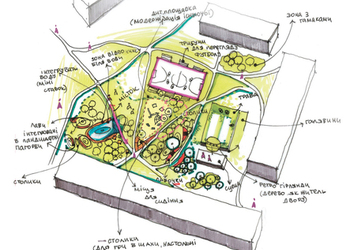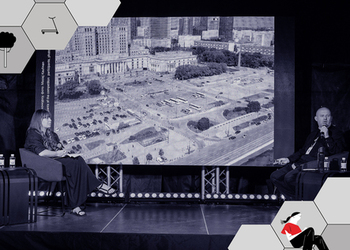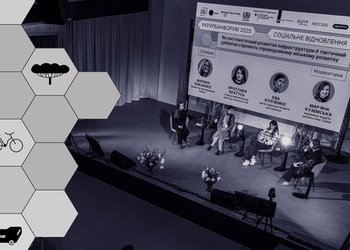In 2017-2018 CEDOS investigated the decision-making process as well as the interaction of between local government bodies and civil society in several Ukrainian cities. This is a brief summary of the research results in Kharkiv.
The brief summary of the study results in Ukrainian is available following link.
The study results of interactions between local authorities and civil society in Kyiv are available by the following link. The study results of interactions between local authorities and civil society in Lviv are available by the following link.
Relevance
Is an effective dialogue between the government and the civil society happening now in Kharkiv? Rather yes than no. But the transparency and general quality of the dialogue does not fully satisfy representatives of either the civil society or the executive government. The Charter of the city’s territorial community provides a number of engagement mechanisms which can be used by residents and non-governmental organizations (NGOs). Due to Kharkiv’s specificity as a student city, the «targeted» Department of Family, Youth and Sports at the Kharkiv City Council (KCC) is the most active in its communication with the community; a Youth Council for the Mayor functions in the city, and several projects have been successfully implemented in partnership between the City Council and NGOs. However, we found that not all engagement mechanisms work equally well.
In our study, we decided to look at this process in more detail: what the KCC does better than other things, what NGOs are satisfied and dissatisfied with, which practices of interaction can be improved. Moreover, in our opinion, it is very important to study the effectiveness and practices of using the engagement mechanisms in real life, even when the mechanisms of their use are enshrined in normative documents and there seems to be no doubt about them. A city can develop in harmony only when its residents have real opportunities to declare their needs, which the city will then satisfy by making both strategic and routine decisions about city development.
The key goal of this study is to evaluate the effectiveness of different engagement instruments based on the experiences and judgements of their core users—NGO representatives and activists, as well as public servants and members of the KCC—in order to find out which methods work well to engage the public and the residents in decision making, and which need to be improved. In addition, we paid special attention to studying the question of justification of strategic decisions that are made in the city.
Methodology
The special methodological characteristic of this study is the use of qualitative sociological methods (interviews and focus group discussions) and the targeted method of forming the list of key informants. We did not survey representatives of all NGOs in Kharkiv, or representatives of all departments and offices at the City Council, or council members from all parties. Instead, we held 2 focus group discussions and 2 interviews with representatives of NGOs and activist circles (a total of 15 participants) who actively work to solve the city’s problems in various spheres (education, culture, history and protection of architectural heritage, community building, creation of public spaces, social work with vulnerable population categories, particularly IDPs, development of the cycling movement, working with youth and students).
We also held 6 in-depth structured interviews with public servants who represented the Department of Information and Public Relations, Department of Family, Youth and Sports, Office for Innovative Development and Image Projects at the latter department, as well as with members of the KCC and a representative of the Youth Council for the Mayor of Kharkiv. The qualitative methodology, in contrast to quantitative methodology, allows us to speak about trends, tendencies and causes of phenomena, but we cannot extend the results of this qualitative study to the whole civil sector of Kharkiv and the work of all departments of the City Council.
In addition to participation in focus groups, all respondents from the civil sector filled in structured questionnaires where they evaluated the mechanisms of community engagement in decision making according to different parameters on a 5-point scale, where 1 was the lowest grade and 5 was the highest.
The field stage of the study was conducted in April—July 2018.
The practical outcome of the study is a set of recommendations for overcoming obstacles in the interaction between civil society representatives and public servants. In our opinion, they are quite universal and can be used in different cities, and they can be included in the curricula of further education programs for public servants and officials of local self-government bodies.
Conclusions
- The Charter of the Territorial Community of Kharkiv and other regulatory documents provide a number of mechanisms for engaging city residents in decision making. The city is implementing new electronic mechanisms of engagement (Kharkiv Resident’s Office, Public Budget). NGO competitions should also be viewed as an engagement mechanism.
- To justify decisions about city development, public servants and council members use both the available statistics collected by various institutions and their own data collected by the KCC. Only in individual cases they mentioned public opinion as a legitimizing factor for decision making.
- Cooperation between different departments in the KCC happens, but it is not systematic and depends on a number of factors: coordinating actions with the mayor, personal contacts between employees from different departments. Initiative is also a factor that positively affects cooperation. In turn, cooperation between NGOs and exchange of experiences, joint work on projects is almost always desirable and widespread.
- The key source of information about the work of the city council is the official website of the KCC. According to NGO representatives, searching for information on the website is difficult, which makes it poorly accessible. For NGOs, the main source of information about opportunities for engagement in decision making in the city are professional communities on Facebook.
- Some KCC members practice public reporting on the results of their work, but the procedure for reporting by City Council members to their constituents has not been officially established. Personal Facebook and Instagram pages are also used actively. For informing the older audience, public offices and meetings with residents on the ground work well.
- In Kharkiv, civil society is actively developing, new organizations are being created, new areas of work are growing: the cycling movement, environmental initiatives, initiatives for transforming Kharkiv into an inclusive city, opportunities for informal education, theater and art projects.
- A considerable barrier to the development of the civil society in the city are the characteristics of interaction with the municipal government. Representatives of some NGOs believe that there is no dialogue between the city council and executive government and the city community, while democratic procedures and engagement mechanisms are used formally, selectively and mostly to legitimize certain actions and decisions by the city government. Among other barriers, the respondents from NGOs mentioned the lack of strategic vision of the city’s development among some of the public servants, and personal protectionism and connections which are a condition for successful cooperation between NGOs and local self-government bodies.
- According to public servants and council members, some NGOs do not properly understand the distribution of responsibilities both within the KCC and between various levels of city administration, nor are they sufficiently familiar with legislation in this sphere, which is also a barrier to constructive interaction between the two types of actors.
- For substantiated decision making, both public servants and NGOs lack statistical data and analyses which would focus on the situation in Kharkiv in particular. The data at the regional level do not always meet their needs, although they are actively used. In addition, some NGOs lack data about the economic indicators of the city’s development, and information about plans in the sphere of urban planning and reconstruction of certain buildings and sites.
- As the convenient formats for learning about the data and research, the participants named infographics, long detailed reports and presentations.
- From the perspective of educational needs, public servants lack knowledge of English for communication with international colleagues and studying the experiences of other countries. Other necessary skills for public servants are public speaking, facilitation techniques, dialogue skills, project management, and improving knowledge and qualifications in their own profession. NGO representatives have a need for training in writing grant applications, for exchanging experiences, and for internships in other organizations (including internships abroad).
- As for the evaluation of specific engagement mechanisms, the respondents noted that norms regarding electronic petitions and local initiatives, which are articulated in the City Charter, are too strict and make it impossible to use these tools successfully. General assemblies at the place of residence are held, but their results are often ignored. Public hearings and community participation in City Council sessions work ineffectively, because the public’s access is significantly limited due to late informing, some activists and representatives of initiative groups behave aggressively at the session meetings, and as a result, access to the meetings is restricted.
- According to representatives of the civil sector of Kharkiv, the most effective method of engagement is the 1562 hotline and direct appeals to representatives of local self-government bodies, including through personal informal contacts. The situational cooperation between the civil sector and KCC is considered to be more attractive than long-term forms of cooperation, such as memorandums.
Recommendations
The qualitative sociological research we have conducted has shown that although there are successful examples of interaction between local self-government bodies and representatives of NGOs and the community in Kharkiv, this interaction is not completely transparent, coordinated and satisfactory for both sides of the process. Public servants and representatives of the civil sector do not use all the available mechanisms of involvement fully due to their mutual distrust and, in some cases, open confrontation.
In view of this, the main general recommendations for improving interaction between the civil sector of Kharkiv and the KCC are: the general practice of joint projects that would facilitate experiences of cooperation and trust-building (if the experiences are positive, of course); openness and transparency of the KCC in the implementation of all engagement mechanisms; and joint training and exchange of interns.
As for specific recommendations, in order to streamline the process of interaction between the government and the community, the implementation of specific procedures must be regulated more clearly. In particular, the procedure of local council members’ reporting to their constituents must be regulated. For this purpose, Provisions on the procedure of councilors’ reporting to their constituents must be adopted. This will allow to establish strong connections between council members and the community and make the City Council’s activities more adequate to the needs and desires of the community.
The KCC must simplify the procedures for direct expression of the community’s opinion, create preconditions for involving city residents in administrative decision making. In order to do this, they need to ease the regulations of participation procedures. For example, they can reduce the number of signatures required to support a local initiative to 1,000. This will make it easier for members of the territorial community to influence the agenda of local self-government bodies.
In addition, it is recommended that the KCC adheres more thoroughly to Ukrainian legislation on local self-government and implements all the provided procedures of interaction between the government and the community. In particular, public hearings have to be held regularly. This will allow to ensure transparency in the Kharkiv City Council’s activities and guarantee that the community has opportunities for influencing government bodies in the periods between elections.



